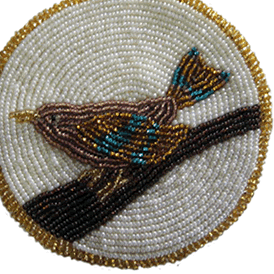

BOOKMAKING
+ WALLET PRINTS
+ SUSTAINABLE
INDIGENOUS TECHNOLOGY + Student Papers and Presentations

sustainable indigenous technology
+ beadwork + carving + drum + leatherwork and sewing + mapping + weavings
Work as a Sacred Part of Creation
Hand work, or Sustainable Indigenous Technologies (known by its colloquialism, ‘Indian crafts’), is a fundamental and ancient set of practices necessary for a healthy life and a healthy community.
The ability to make all sorts of things by ones’ own hands is a highly valued personality trait among many of the world’s peoples. In many aboriginal communities, skilled hand work is an honorable job, hobby, craft, and way of life. The ability to Make, is a sacred gift.
Before the Great Change and its associated Others, Technology and Craft specialization made living comfortably possible, was the backbone of the extensive aboriginal trade networks of the Americas, and was the original (Aboriginal) American economic network. Trade had a role in making all sorts of relationships possible; marriage, blood and kinship ties, political alliances and confederacies, exchange of technologies and artists/craftspersons; a sharing of life in all its gloom and glory.
After the crisis of successive waves of colonization, Making remains a means with which many aboriginal peoples are able to maintain spiritual, ecological, and cultural practices, beliefs, and relationships. Making is the means to express beliefs using old and new materials and old and new methods, and in a very real and basic way, to provide materially for our families.
Hand work demands relationship with many Beings; physical and Supernatural.
A Maker must first understand by experience his or her HomeLand ecosystems and all of her Beings (such as plants, animals, insects, birds, water and its beings, minerals, geology, weather, everyone and everything), and consider these Beings – their feelings, their uses, their names - as he or she enters the beautiful wild in order to offer thanks, to gather, and to pre-prepare materials for later processing. Artists are active participants in the seasonal round, a natural history calendar of seasons where certain principals (ie; materials) become available to be made into art.
One Who Makes Things is in relationship with skilled others (teachers, elders, artists, technologists, and mentors), who carry traditional knowledge from past times, and bring them current into modern times, with our modern worries and fast paced machined lifestyles. A Maker must balance the contradicting philosophies of time-consuming processes in a world that values assembly line speed. A maker must appreciate the imprint their own individuality leaves upon their art, and be at ease with the knowledge that what they make will never look like that processed by industry.
Making Things demands a sacrifice, of personal time, family time, social time, and of the self. One must maintain their understanding of various tools, techniques, tricks, shortcuts, long ways, and the only way to do so is to involve oneself continually in the practice of Making.
To work in an indigenous tradition is to adhere to culturally relevant protocols and Spiritual practices related to the materials, places, and practices the art is a part of. One develops a sympathetic relationship with the art materials, and a deep practice-based involvement with aboriginal history.
Acknowledgement and respect for the Earth, other living beings, and the self are critical, as is a willingness to share, help others, see clearly, and listen deeply.
Conversations and relationship with all involved entities ensures successful creation of art, craft - Indigenous Sustainable Technologies.
* annie ross
